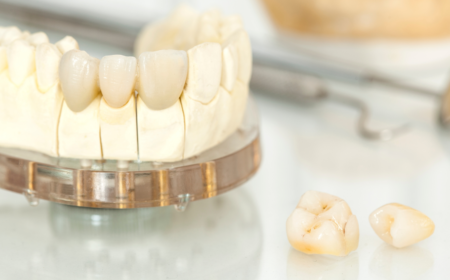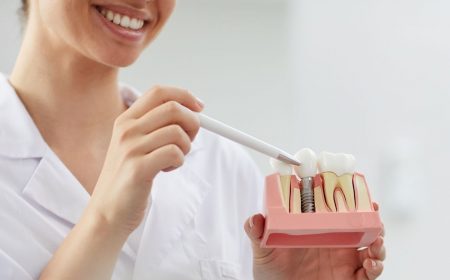
For those who have lost a tooth due to injury, decay or gum disease, dental implants are an excellent option for replacing teeth. A dental implant works by replacing the roots of a missing tooth to support an implant crown that functions as an artificial tooth. (Refer to our article Dental Implants 101 to learn more about what dental implants are.)
However, the price tag on dental implants may be cause for concern as they can be expensive. Therefore, deciding on an affordable tooth replacement plan also includes weighing the pros and cons of your options.
In this article, we address common questions about the cost of dental implants in Singapore, as well as provide alternatives to dental implants. Here are the topics we will be covering:
- How much does a dental implant cost
- What affects the cost of dental implants
- Are the procedures for dental implants subsidised
- How can I use Medisave to pay for dental implants
- Does insurance cover the cost of dental implants and dental services
- Dental implants VS dentures
- Dental implants VS dental bridges
Costs of dental implants in Singapore
The costs of a dental implant in Singapore depend on the complexity of the procedure and can range from $1,500 to $6,000, depending on where you receive your procedure (such as at a private dental clinic or a public hospital).
How much does a dental implant cost at NTUC Health Denticare?
At NTUC Health Denticare, beginning your journey to replace missing teeth starts with a dental implant consultation.
The cost of a dental implant done by a general dentist starts from $1,700.
For more complex procedures requiring a specialist, the implant procedure cost starts from $2,100.
These are the costs per tooth and do not include the costs added up after bone grafting, sinus lifts, CT scans, other surgical procedures and follow up consultations where necessary.
Here is a breakdown of some of the costs associated with dental implant procedures at NTUC Health Denticare:
| Dental Implant Consultation (General Dentist) | $50 |
| Single Dental Implant (General Dentist)* | From $1,700 |
| Dental Implant Consultation (Specialist) | $100 |
| Single Dental Implant (Specialist)* | From $2,100 |
| Bone Graft | From $300 |
| Implant Crown | From $1,800 |
These prices are exclusive of GST and correct at the time of publishing. Please check with our clinics for the latest prices.
What factors affect the cost of dental implants?
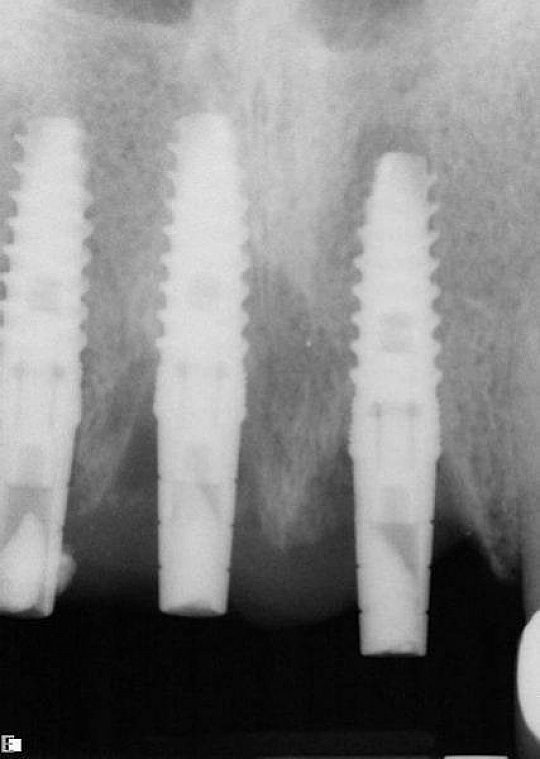
A number of factors will determine how much a dental implant costs and what you should expect from the timeline. These factors include but are not limited to:
- Number of missing teeth (single tooth replacement or multiple teeth replacement)
- Type of missing tooth that you want replaced (incisor teeth, canine teeth or molar teeth)
- Type of surgical procedure required (surgery to lift the sinus cavities, bone grafting surgery, gum surgery prior to beginning treatment)
- Brand of implant used
- Type of material used for the restorative crown
- Dentist’s level of experience
Are the procedures for dental implants subsidised?
Patients who are Singaporeans or Permanent Residents of Singapore may be able to claim a portion of their dental implant surgery expenses from their Medisave Account.
In the event that your Medisave balance is insufficient, your immediate family members (spouse, parents, siblings or children) may use their Medisave to help you with the bill payment. Please note that the use of Medisave is still subject to Medisave withdrawal limits.
Do note that dental implant procedures are not subsidised under CHAS, Pioneer Generation or Merdeka Generation discounts.
How can I use Medisave to pay for a dental implant?
To offset your dental implant cost, Singaporeans and Permanent Residents can claim up to $950 for a single tooth implant from their Medisave account.
| Procedures Covered | Medisave Withdrawal Limit (S$) |
|---|---|
| Single dental implant | Up to $950 |
Note: The amount claimable is stipulated in surgery tables set by MOH in Singapore. The above table is only a simple guide and the final amount may vary depending on the complexity of the case and the withdrawal limits set by MOH. The final amount deductible from the Medisave Account is dependent on the final approval by MOH.
Does insurance cover the cost of dental implants and dental services?
Depending on your insurance provider and the circumstances
surrounding how you lost your teeth, you may or may not qualify for
claims with your insurance company. NTUC Health Denticare does not do
e-filing for insurance claims, and you will need to consult your agent
for more information.
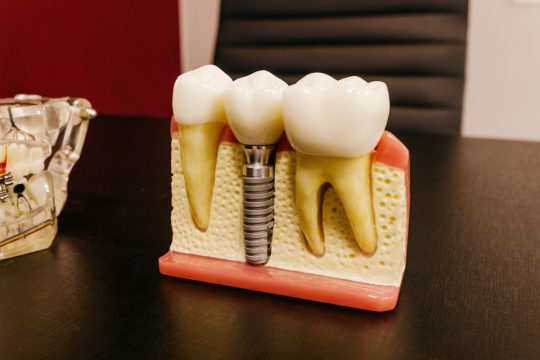
Alternatives to dental implants for replacing lost teeth
Dental implants may not be for everyone. Aside from the costs involved, dental implant surgery and implant placement require sufficient bone in the jaw to support the implant. Patients with uncontrolled diabetes, active gum disease or on strong blood thinners may not be suitable for implant surgery.
The good news is that there are other options for replacing missing teeth. Let’s compare some of these procedures.
Dental implants versus dentures
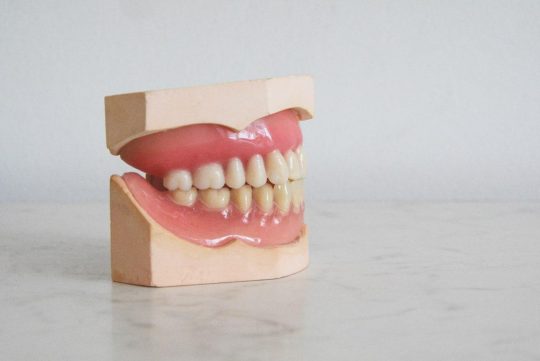
Pros:
Conventional dentures are a cheaper option for tooth replacement. Dentures can be made of plastic, metal or a combination, and are attached to the mouth using clasps that fit over your gums.
A partial denture costs $220 – 460 per arch. Seniors with CHAS, Pioneer Generation or Merdeka Generation Cards will be happy to hear that they are entitled to the relevant subsidies for dentures:
- Orange: Between $50.00 and $170.50 per procedure
- Blue: Between $75.00 to $256.50 per procedure
- Merdeka Generation: Between $80.00 to $261.50 per procedure
- Pioneer Generation: Between $85.00 to $266.50 per procedure
Here is a quick comparison of prices for partial dentures, full dentures and dental implants:
| Partial Denture (per arch) | Full Denture (per arch) | Single Dental Implant with a Generalist | Single Dental Implant with a Specialist |
|---|---|---|---|
| $220.00 – $460.00 | $550.00 – $850.00 | From $1,700.00 | From $2,100.00 |
Cons:
Dentures, however, are not permanent and need to be removed from the mouth before bed every night. Some patients also experience a sensation of crowdedness in their mouth and difficulty speaking when getting used to dentures.
Should you prefer a more permanent and stable solution, you may consider investing in dental implants over dentures, which provide you with a better and more natural chewing experience. Dentures will also need to be replaced every 5 – 8 years, and these multiple procedures can add up in terms of cost.
Dental implants versus dental bridges
Pros:
If you have a gap of one or more missing teeth, a dental bridge can be used to replace them. The procedure does not require surgery and can be a viable alternative for patients with insufficient bone to place a dental implant.
Cons:
Dental bridges will require preparation of adjacent teeth beside the gap to accept a dental crown. The crowns are linked to each other via a metal or zirconia framework spanning across the space, with a ceramic tooth built over it to cover the gap.
Should the neighbouring teeth on either side of the bridge be in poor condition, you may need to undergo root canal treatment before fixing the bridges on them, which is an additional cost.
Special flosses are also needed to clean under the bridge which may otherwise lead to decay.
Here is a quick comparison of prices for dental bridges, root canals and dental implants:
| Dental Bridges | Root Canal | Single Dental Implant with a Generalist | Single Dental Implant with a Specialist |
|---|---|---|---|
| From $1,950.00 | $400.00 – $800.00 | From $1,700.00 | From $2,100.00 |

Invest in dental implants for a complete smile
Dentures, bridges and implants are all dental treatments that can replace lost teeth. There is no one best solution to replace that missing tooth, as each restorative method has its own advantages and disadvantages, depending on the individual patient’s needs. Often it comes down to a trade-off of factors such as cost, convenience, oral health status, or personal preference when choosing between them. Here are some reasons why you might consider dental implants over other tooth restoration methods:
- Dental implants are a good way to restore structure to your face and is currently the only known method of preserving jaw bone in areas of tooth loss.
- Dental implants are also a great investment in preserving your quality of life. In the long run, they may be more cost-effective than prosthetic dentures or bridges. A dental implant can last for over 10 years¹ or more with good oral care and overall health,
- They are also easy to clean. Treat it as you should a regular tooth with proper brushing and flossing to maintain your oral health.
- With dental implant procedures, there is no need to sacrifice or prepare your other teeth like you would with dental bridges.
Summary
If you’ve been thinking about getting dental implants to replace your missing teeth, but are a little intimidated by the cost or what it will entail, we have some reassuring news for you. Dental implant procedures are not only one of the most effective ways to restore your smile and improve your quality of life; they also offer many benefits over other solutions that may seem cheaper at first glance.
Your smile deserves nothing less than the best, and it starts by getting educated on how dental implants might benefit you.
Make an appointment today!
Call us at 6336 6222 or get in touch via our e-appointment form to book your appointment today!
Other FAQ on dental implant cost and procedures
-
Why are dental implants in Singapore costly?
Dental implants are costly as they are made with high precision using biocompatible materials under stringent infection control standards.
Our dentists will be able to advise further on dental implant costs for each individual case.
-
Do I need a bone graft for a dental implant?
Bone grafting is not always required when getting a dental implant. However, in cases where this procedure is required, bone grafts may help to improve the patient’s chances of a successful treatment outcome. Speak to our dentists to find out if this is required in your treatment plan.
-
What can I eat after dental implant surgery?
For the first 48 hours after each procedure, stick to soft foods to protect the surgery site. Avoid things that are too chewy, hard or crunchy as they might damage your teeth and gum tissue.
After everything is healed, you may return to harder, crunchier food with your new tooth!
¹Titanium Alloys for Dental Implants: A Review (Source)
